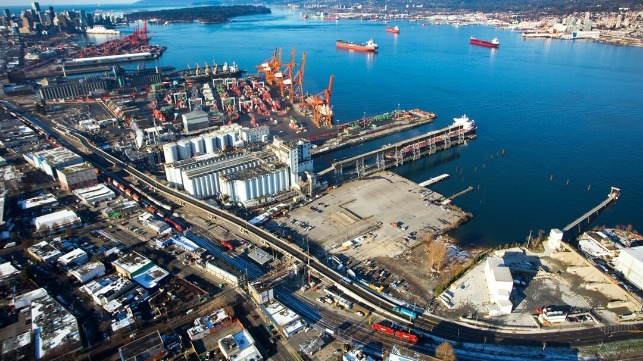Port of Vancouver Rail Service Washed Out by Flooding in BC

After days of torrential rains pounding the Pacific Northwest, the Port of Vancouver, Canada reports that rail service has been suspended due to flooding and washouts impacting the rail lines inland in British Columbia. It marks the second time this year that the port has had its rail service suspended due to natural disasters and comes as they are already struggling to keep up with the surge of cargo through the port.
The deviation from the rains has been widespread across Canada’s western province. So far, authorities report that they have recovered the body of one person that was killed in a mudslide while many others are feared missing or killed. One eyewitness said that at least 10 cars were swept off one of the major highways in British Columbia. The Royal Canadian Mounted Police reported only seven of the cars have been located while across the province thousands of people have been moved into temporary facilities due to the widespread flooding. BC’s Minister of Public Safety, Mike Farnworth, said in a briefing on Monday that they believed as many as 80 to 100 cars and trucks were trapped on another major highway in the province.
BC Transportation Tweeted out photos showing large sections of the earth washed away from under the rail tracks at various points across the province. Both Canadian Pacific and Canadian National Railway confirmed that they have been forced to suspend service in British Columbia due to damage to the tracks. They said they were no reports of injuries or losses on their systems, but due to the unsafe conditions had not yet been able to reach the damaged areas to begin to assess repairs.
A look from a flyover of #BCHwy1 at Tank Hill near Lytton and Nicomen.
— BC Transportation (@TranBC) November 15, 2021
For the latest #BCStorm travel info, check @DriveBC's website: https://t.co/0sq39Ad5WN#TransCanadaHighway pic.twitter.com/N4zVto5vNK
“All rail service coming to and from the Port of Vancouver is halted because of flooding in the British Columbia interior,” port spokesperson Matti Polychronis told Reuters this afternoon. They reported that shipments of grain, coal, and potash were all likely to be impacted while one of the largest gain exporters said they were unable to move product at a critical time of the year for the trade. One of Canada’s largest crude oil pipelines was also forced to suspend operations as western regions of Canada received a month’s worth of rain in less than 24-hours on November 14 into the 15th.
The interruption comes as the Port of Vancouver reported that it had a total of 61 vessels today, including 23 vessels at berth and another 33 currently at anchor. This included six container ships on berth with an equal number at anchor. Critically, there are also 16 gain carriers at anchor and four on berth prepared to transport Canada’s crop after the fall harvest.
Climate change has been effecting Canada badly. This year we had record high temperatures and now floods and mudslides have effected Southern British Columbia Province.
— Khurram Khowaja (@HaqJiyala) November 16, 2021
World leaders need to sit together and address this issue as a priority. @JustinTrudeau @BBhuttoZardari pic.twitter.com/PACONBXoAe
In British Columbia, we burn in summer and flood in winter ???????????? pic.twitter.com/ZlFPmPdZg6
— Disa (@disablingbabe) November 16, 2021

that matters most
Get the latest maritime news delivered to your inbox daily.
It is the second time this year that Vancouver has experienced a disruption to rail service. In July, wildfires swept across portions of British Columbia covered the city with a thick cloud of smoke. Further to the east, inland in British Columbia in the same areas now being devastated by the flooding, the fires damaged sections of the two major rail lines interrupting trains in and out of the Port of Vancouver for nearly two weeks.
No one is certain how long the current disruptions will last. The railroads have limited alternatives to reroute trains through sections of the impacted region. One shipper said they were hopeful that at least limited service might resume by this coming weekend. Some are however saying that the lines could be disrupted for weeks while the railroads said it was too early to make estimates until they could reach the impacted areas.
